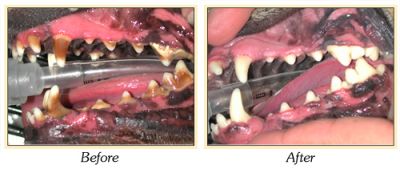
Posted By:
Our pets bring joy and excitement to our lives; however, pet ownership also comes with the responsibility of caring for them and providing for their health needs. One of the most overlooked areas of our pet's hygiene is their oral health! There are some breeds, particularly the greyhounds and whippets, which are particularly prone to this issue, and as they reach middle age, we invariably find that tartar is building up, and tooth decay is setting in. This can happen to any one of our pets, if the correct care is not given.
The best way to control the onset of dental disease is brushing. This can be done in the same way as in us humans, however ensuring that we only use a toothpaste that is made for our furry friends, this ensures that there are no ingredients in them, that could cause them harm. An example of this is the fluoride that is found in our human toothpaste. A soft bristled toothbrush is best for this, allowing us to be sure that we are not causing any damage to the teeth and gums, and makes it more comfortable for our pets. Brushes which can go onto our fingers are also helpful for the less eager individuals, who aren't as accepting of tooth brushing.
It is easy to say to everyone that we need to brush our animals’ teeth. However, sometimes it is impossible! Other options are available, for example dental sticks or toys for our dogs to chew, these can help to remove the tartar and stop the onset of dental disease, however, they are quite fattening, so it's best to only have these every so often! There are some products on the market that you can add to the pet's normal food, to help with oral hygiene. These are not as fattening and still do a good job of keeping our animals’ teeth in the best condition. This is a good option for cats, who are less likely to want to chew on their treats, and who are less than likely to want to have their teeth cleaned!
When you bring your pets in for their annual vaccinations, we will always check their teeth, as part of their health check, we can then recommend the best course of treatment, and whether we need to go head with a full dental. This involves a full general anesthetic, and starts with a scale and polish, this allows us to see the level of dental disease that is present underneath the tartar build up. We will remove the teeth that need to be removed. This can take quite a long time, particularly when faced with a big tooth with three roots, that has cracked, and is otherwise in very good condition. Sometimes these require surgical extraction, involving the drill and sutures to close the hole left behind!
The main symptoms that your pet may show that may suggest that we need to do a dental, are smelly breath, wobbly or tartar covered teeth, and sometimes pain when eating, which can be seen if they are suddenly playing with their food before eating it. If you have any concerns that your pet may have some dental discomfort, then book in for a consult, or mention it at their next vaccination!
Whilst on my visits I have been having several discussions...
As our feline friends get older there are a few conditions...
Another winter discussion group season is now behind...
©2024 Shepton Veterinary Group Ltd., All rights reserved.
Privacy Policy • Terms & Conditions • Cookie Policy